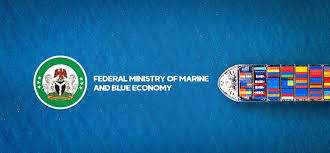Marine and Blue Sector: Contributing to Nigeria’s economic growth
David Adekunle, Lagos
The marine and blue sector occupies a central position in Nigeria’s drive to economic development and increased revenue generation.
The blue economy goes beyond shipping, oil and gas, and encompasses all activities geared towards harnessing the natural resources that abound in the ocean, including fishery, renewable energy, offshore power support network, and repairs.
About 40% of the world’s population lives near coastal areas. This offers more than 3 billion people the opportunity to utilize the oceans for their livelihood, while 80% of world trade is achieved using the sea.
Available data from the Nigerian Maritime Administration and Safety Agency (NIMASA), says Nigeria’s untapped blue economy potential is valued at 296 billion dollars.
This shows that sustainable exploitation of resources in the blue economy can lead to job creation, improve food security, tourism and infrastructure development, and green energy among others.
Nigeria’s President, Bola Ahmed Tinubu, upon assumption of office in May 2023, created the Ministry of Marine and Blue Economy based on the sector’s importance with clear objectives to explore and exploit the potentials of the oceans, seas, and coastal areas.
Already, five deep seaports are being considered, they are Badagry Deep Seaport in Lagos, Ondo Deep Seaport in Ondo State in Southwest Nigeria. Others are the Ibom Deep Seaport in Akwa Ibom, Bonny Deep Seaport in Rivers State, and Benin River Port in Edo State in the South-South zone of the country.
The Badagry Port is a $2.59 billion investment already approved by the Federal Executive Council with the potential to create about 250,000 jobs and attract foreign direct investment. It is expected to generate annual revenue of $53.6 billion.
On the other hand, the Ondo Port is driven by the state government together with private investors.
The Benin River Port, the Bonny, and the Ibom Deep Seaports in the South-South region will help to reduce the pressure in the Lagos area and open new investment opportunities in the South-South and South-East regions.
For Nigeria to create more wealth and jobs needed to turn the economic fortunes around for the country, it needs to develop the five deep seaports faster and based on the plans.
Doing so will create a network of modern ports that can improve the turnaround time of vessels coming to Nigeria as well as help to decongest existing ones.
Another issue that needs to be addressed is the revival of the National Shipping Line, which collapsed in the 1990s. This left the country’s shipping business in the hands of foreigners. As a result of this, the Nigerian ship charter market, which is estimated to be worth about 10 billion dollars annually, is handled by foreign-owned ships.
Nigeria is also facing illegal, unreported, and unregulated fishing activities mostly perpetrated by foreign fishermen. It is estimated that Nigeria loses over 70 million dollars in revenue to illegal and unregulated fishing.
Experts in the maritime sector have declared that illegal exploration of Nigerian waters is huge and can be estimated at between 600 million and 800 million dollars yearly. These experts have insisted that vessels from China, the European Union, and Belize are notable for exploiting Nigerian waters illegally.
To put an end to revenue and job losses from Nigeria’s waters, Nigeria must enact the Maritime Zone Act to put an end to the illegal exploitation of the country’s aquatic resources.
Most importantly, the blue economy could be better driven by private operators through the strengthening of regulations and oversight functions that will ensure safety in line with international standards.
The Nigerian government, through NIMASA, must engage the National Assembly to review relevant maritime laws that would have some punitive clauses on foreign trawlers who engage in illegal fishing activities.
Truly, Nigeria’s maritime sector is enormous and capable of generating over seven trillion naira annually and creating about 40 million jobs, if properly harnessed.
This calls for deliberate implementation of policies that will enable investors to take advantage of the abundant economic opportunities in the Nigerian maritime sector for a better utilization of the resources in the marine and blue economy sector in Nigeria.


Comments are closed.